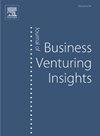From emergency relief to empowerment: Transitioning government-led social entrepreneurship practices to support Ukrainian refugees
Q1 Business, Management and Accounting
引用次数: 0
Abstract
This rapid response paper seeks to support Sanctuary Ukraine (SU), a municipality-led initiative that has augmented its traditional governmental work with social entrepreneurship practices to provide services for Ukrainian refugees. SU initially focused on emergency reception and housing services with the support of external NGOs and volunteer groups. However, as the Russia-Ukraine war persists well into 2025—and with it the prolonged displacement of Ukrainian residents—SU has increasingly shifted its focus toward activities aimed at empowering refugees over the long term. We identify three problems that have emerged during this transition, and drawing on existing evidence in the academic literature, we offer concrete recommendations for adapting SU's activities (taking a translational research approach). First, we propose strategies for nurturing community collaboration toward common goals to mitigate competition and conflict that can arise within a fragmented refugee community. Second, we show how refugee identity narratives can be grounded in a sense of personal value and belonging to foster commitment to integration among refugees who feel caught between repatriation and settling in the host country. Lastly, we suggest ways in which institutional structures and processes can be leveraged to shelter refugees from the debilitating effects of prolonged and indeterminate uncertainty.
从紧急救济到赋权:过渡政府主导的社会创业实践,以支持乌克兰难民
这份快速反应文件旨在支持“乌克兰避难所”(Sanctuary Ukraine,简称SU),这是一项由市政府牵头的倡议,通过社会企业实践来增强其传统的政府工作,为乌克兰难民提供服务。社联最初的重点是在外部非政府组织和志愿团体的支持下提供紧急接待和住房服务。然而,随着俄乌战争持续到2025年,随之而来的是乌克兰居民的长期流离失所,苏越来越多地将重点转向旨在长期赋予难民权力的活动。我们确定了在这一转变过程中出现的三个问题,并根据学术文献中的现有证据,我们提供了适应SU活动的具体建议(采用转化研究方法)。首先,我们提出了促进社区合作的策略,以实现共同目标,以减轻分散的难民社区中可能出现的竞争和冲突。其次,我们展示了难民身份叙事如何以个人价值和归属感为基础,以促进在遣返和在东道国定居之间感到进退两难的难民融入社会的承诺。最后,我们建议利用体制结构和进程的方法,使难民免受长期和不确定的不确定性的削弱影响。
本文章由计算机程序翻译,如有差异,请以英文原文为准。
求助全文
约1分钟内获得全文
求助全文
来源期刊

Journal of Business Venturing Insights
Business, Management and Accounting-Business and International Management
CiteScore
11.70
自引率
0.00%
发文量
62
审稿时长
28 days
 求助内容:
求助内容: 应助结果提醒方式:
应助结果提醒方式:


